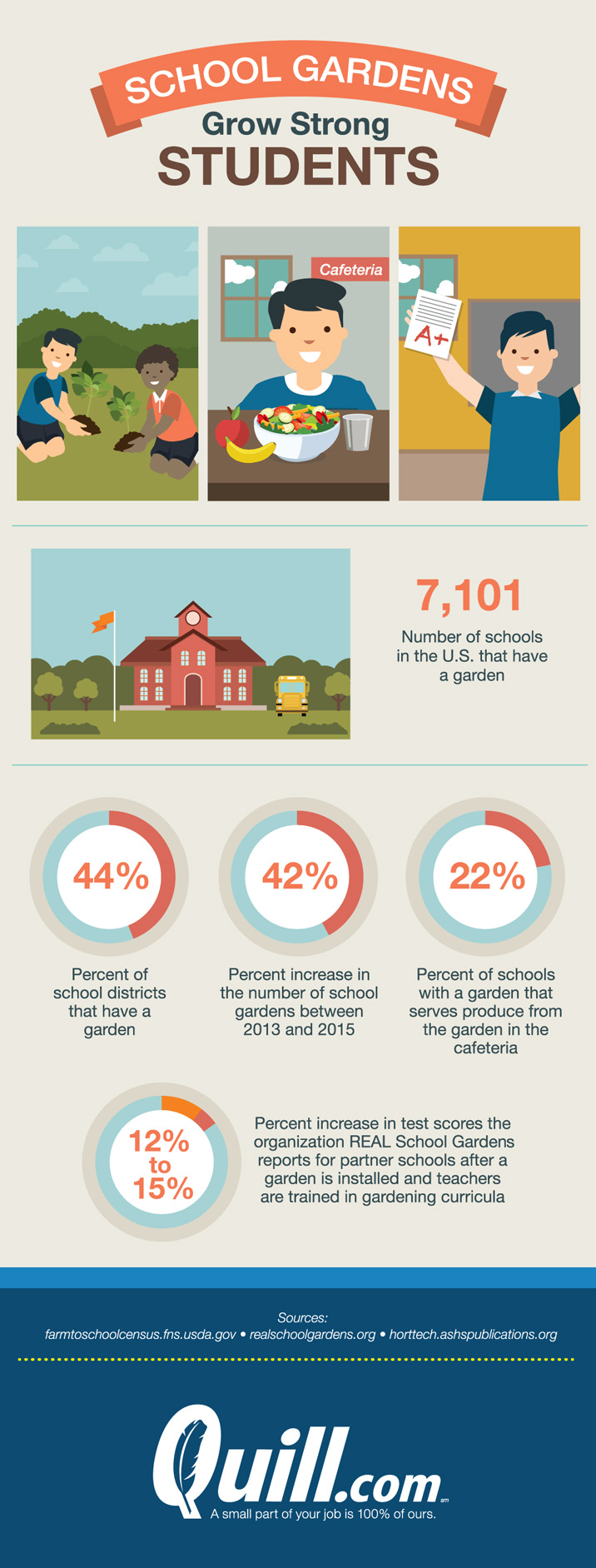Grow Together: The Benefits of Starting a School Garden Program

Grow Together: The Benefits of Starting a School Garden Program
“A garden is a grand teacher,” horticulturist Gertrude Jekyll wrote. School administrators obviously agree because the nation is in the midst of a school gardening boom. The number of school gardens nearly doubled between 2013 and 2015. More than 7,000 American schools now have a garden.
Most teachers start a school garden program in elementary schools, and grow flowers or veggies. Some include unique features, such as chickens, orchards, and aquaponics systems (where students raise fish and use the fishes' waste to feed plants). Teachers use gardening activities to teach nearly every discipline, including health, nutrition, science, math, environmental studies, language arts, art, and social studies. Students in one California school sow native plants to learn what the state looked like prior to European settlement. In other schools, kids test soil composition, learn about food chains and ecosystems, measure plants as they grow, calculate the perimeter and area of garden beds, and keep gardening journals.
Researchers examining how gardening impacts students have found that school gardens–sometimes called “living classrooms”–cultivate more than just plants. Students who participate in school gardens are on average more engaged in what they're learning, boast higher science test scores, and eat more fruits and vegetables than their non-gardening peers.
Cultivating Young Minds
Teachers who integrate gardening into lessons say it is a powerful, hands-on learning tool that engages kids better than typical classroom instruction. Quantitative data supports these observations. Middle schoolers who took part in the Edible Schoolyard Project at a large urban California school improved both their overall GPAs and their math and science grades.
In a review of 12 studies, students who gardened performed better on standardized science tests than their non-gardening peers in all 12 studies. Fifth-grade gardeners in one study scored nearly 15 percent higher on the standardized science test than a control group. REAL School Gardens, an organization that builds gardens for low-income schools, says students at their partner schools improve 12 to 15 percent on standardized tests after gardening is integrated into school curricula.
Fertilizing Social and Emotional Development
Caring for plants together and waiting for them to grow also teaches kids about cooperation, responsibility, patience, and delayed gratification. In a study of a year-long garden program for third, fourth, and fifth graders, students improved teamwork skills and markers of self-understanding, a term used to describe a person's ability to comprehend his or her own actions. Nature-based activities, including gardening, also help kids relieve stress, improve attention spans, and ease symptoms of ADHD.
Most kids love learning in the garden. In an evaluation of seven qualitative school garden studies, the majority of kids in every study said they enjoyed gardening at school. Elementary–aged students in one survey reported feeling “happy, relaxed, calm, and safe” while working in their school garden. And it's not just students who benefit emotionally and socially from school gardens; teachers who are trained to do garden activities with their students report higher morale and job satisfaction.
Planting Healthy Lifestyles and Environmental Consciousness
Learning to garden as a kid can shape life-long habits. School gardens can improve children's eating habits, at least in the short term. In an analysis of studies on the subject, researchers concluded “gardening increased vegetable consumption in children, whereas the impacts of nutrition education programs were marginal or nonsignificant.” Advocates hope the healthier food preferences inspired by school gardens will last into adulthood and help curb the current obesity trends. In the past three decades, childhood obesity has more than doubled, and 42 percent of Americans are expected to be obese by 2030.
Gardening may also inspire an increasingly urban population–81.5 percent of American kids live in urban areas–to take care of the environment. Many kids put their hands in dirt and relate with the natural world for the first time in school gardens. A number of studies show kids who participate in nature-based activities in elementary school are more likely to have an affinity for nature as adults. That's important: As forestry engineer Baba Dioum famously said, “In the end, we will conserve only what we love, we will love only what we understand, we will understand only what we are taught.”
Conclusion
Not all school gardens flourish. They require time, support, and hard work. And they have the most impact when teachers are extensively trained in gardening curricula. That said, research suggests the effort is worthwhile. When school gardens thrive, they have the potential to nourish academic learning, social skills, healthy lifestyles, and environmental consciousness.

Share this Image On Your Site
Abby Quillen is the author of the novel The Garden of Dead Dreams and the editor of two anthologies. Her articles and essays have appeared in YES! Magazine and The Christian Science Monitor and on Common Dreams, Nation of Change, Reader Supported News, The Daily Good, Truthout, and Shareable. She lives in Eugene, Oregon, with her family. When she's not writing, she grows vegetables and weeds, bikes and walks as much as she can, and jots down cute things her kids say.
Quill help center
New to Quill? Would you like to learn more about how we can help your business?
